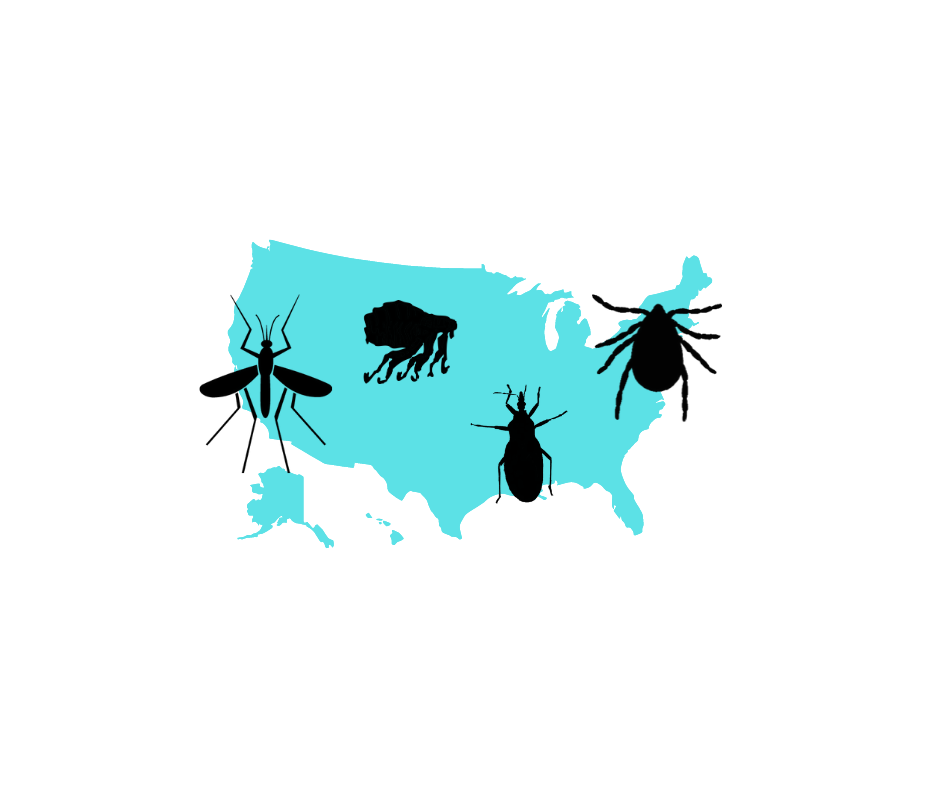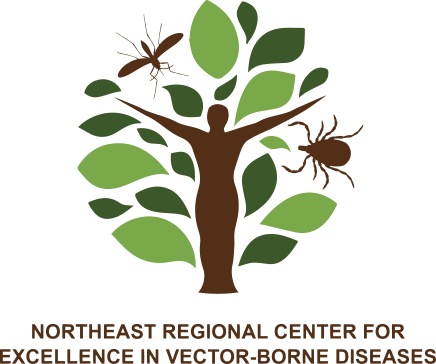Resources for Professionals in Vector-Borne Disease
Resources listed below provide guidance for professionals working with ticks, mosquitoes, and public outreach and education programs on vector bite prevention.
Vector Surveillance Guidance Documents & Toolkits
Mosquito Focused
American Mosquito Control Association Best Management Practices
Best Practices for Integrated Mosquito Management and Mosquito Management During a Public Health Emergency
Centers for Disease Control & Prevention:
National Association of County and City Health Officials:
Tick Focused
Centers for Disease Control & Prevention
- Surveillance for Ixodes scapularis and pathogens found in this tick species in the United States
- Guide to the Surveillance of Metastriate Ticks (Acari: Ixodidae) and Their Pathogens in the United States
General Resources & Toolkits
Association of State and Territorial Health Officials
Centers for Disease Control & Prevention
- A National Public Health Framework for the Prevention and Control of Vector-Borne Diseases in People
- Specimen Submission Instructions to the CDC Diagnostic Laboratories
National Association of County and City Health Officials
National Environmental Health Association
One Health Vector-Borne Disease Hub
Communication & Outreach
Centers for Disease Control & Prevention
- Communication Resources, Division of Vector-Borne Diseases
- Tick image library
- Mosquito image library
- Vector-Borne Diseases Social Media Toolkit
Training & Professional Development: Vector Surveillance & Control
American Mosquito Control Association - Integrated Mosquito Management
To help train the nation’s vector control work force on the principles of Integrated Mosquito Management and how to execute data-driven mosquito control, the Centers for Disease Control and Prevention (CDC) funded the AMCA to create a virtual training program. This program consists of 13 modules created and instructed by 24 different experts located throughout the U.S., Puerto Rico, and Australia. Each module contains a reading from the AMCA’s Best Practices for Integrated Mosquito Management manual, a focused video on the topic between 13-33 minutes long, and a 10-question quiz covering both the reading and lecture. After completing the training program, a student may choose to take a 100-question, comprehensive exam to earn a certificate recognizing their accomplishment.
American Mosquito Control Association - Mosquito Management During a Public Health Emergency
To help the nation prepare for and respond to a mosquito-driven public health emergency, the Centers for Disease Control and Prevention (CDC) funded the AMCA to create a virtual training program on mosquito control emergency response. This program consists of 10 modules created and instructed by 21 different experts located throughout the U.S. After completing the training program, a student may choose to take a 100-question, comprehensive exam to earn a certificate recognizing their accomplishment.
Certification in Public Health Entomology
The Midwest Center of Excellence in Vector-Borne Diseases (MCE-VBD) is offering a certificate in Public Health Entomology to recognize and provide basic skills related to the surveillance and management of mosquito- and tick-borne diseases. The certification process is open to anyone affiliated with MCE-VBD partner organizations with interest in developing skills in vector-borne disease surveillance and control.
eCornell Online Program in the Biology of Mosquitoes, Ticks, and Other Disease-Causing Arthropods
The Cornell Department of Entomology has partnered with eCornell to provide a 4-week online training program on the biology of arthropods — both insects and related forms — that impact human health. You will explore the fascinating biology, behaviors, and disease-transmission processes of a range of organisms, with special emphasis on the most important groups, including ticks and mosquitoes. You will also learn about specific diseases associated with these vectors that can be passed on to humans. The course is appropriate for those working in healthcare and vector-borne disease control, those who train and supervise outdoor workers, and will also be useful for students of vector biology who may not have access to other courses on this topic. $399 total cost. Enrollment discounts may be available. This course has been approved for 28 contact hours of continuing education with the National Environmental Health Association.
Visit the course page for information on the next course cohort.
eCornell Online Program in Vector-Borne Disease Surveillance
The Cornell Department of Entomology has partnered with eCornell to provide a 4-week online training program to help you understand the tools, methodology, and best practices for the surveillance of arthropod vectors, including ticks and mosquitoes. You will gain the knowledge and resources necessary to design an effective vector surveillance program in your local jurisdiction. The course is intended to train and create a network of public health practitioners, from a variety of backgrounds, in entomology and in the approaches, techniques, and skills required for effective surveillance programs. $399 total cost. Enrollment discounts may be available. This course has been approved for 28 contact hours of continuing education with the National Environmental Health Association.
Visit the course page for information on the next course cohort.
Entomological Society of America Certification Programs
The Entomological Society of America Certification Corporation offers two certification programs for professionals who work with insects:
- Board Certified Entomologist - program for professional entomologists with degrees in entomology or a closely-related field
- Associate Certified Entomologist - program for pest management professionals with strong training and experience in insect-related work, but without academic training required of professional entomologists
- Public Health Entomologist (PHE) Certificate - program for pest management professionals who work with pests that pose a health risk
Entomological Society of America Professional Advancement Career Training (PACT) Initiative
Graduate Students and Postdocs in Entomology: Are you looking for tools and training to make yourself stand out as you look for the next step in your career? ESA’s new Professional Advancement Career Training (PACT) Initiative will help you develop the leadership capacity and “soft skills” sought after in today’s highly collaborative work environments—both within and beyond academia.
EPA Integrated Pest Management Webinars
The EPA Center for Integrated Pest Management hosts a yearly webinar series featuring experts from across the country relaying educational and practical strategies for establishing and improving integrated pest management programs in your facilities and environments.
Upcoming Webinars Previous Webinars
Global Vector Hub: Directory of Medical Entomology Courses
TDR has supported the development of a Global Atlas of Medical Entomology Schooling (GAMES), which lists a total of 126 medical entomology courses offered both on-campus and through distance learning in 32 countries across all WHO regions, covering seven languages. For each course, session dates, course outline, fees, language of instruction and responsible managers are listed.
Follow the link below to gain access to the directory. Please register on Global Vector Hub.
Mosquito Training Course for Pest Managers
The Southeastern Center of Excellence in Vector Borne Diseases, along with partners in the University of Florida’s Institute of Food and Agricultural Sciences, is pleased to announce a new online course in mosquito training for pest managers. Participants who complete the 11 modules in the course will learn to identify and understand the mosquitoes of major importance in the urban environment, their life cycles, the general methods of control, personal protective equipment required for safe insecticide application, and the laws and regulations governing mosquito control for the urban pest management industry.
NACCHO’s Practical Guide to Building Local Mosquito Control Capacity
The National Association of County and City Health Officials and its vector control workgroup members identified the need for a focused, practical guide to help local health departments build new local mosquito control programs or enhance existing capabilities in the core competencies.
NEHA Vectors & Pests Webinars
The National Environmental Health Association (NEHA) produces open-access webinars to improve the capacity of environmental health to identify and understand emerging vectors found in the United States. The NEHA Vector & Pests Webinars page provides up-to-date information on vector control topics and resources used to protect the public of the transmission of vector-borne diseases.
NEVBD-TEC Mosquito Rearing & Pesticide Resistance Assay Training Videos
NEVBD-TEC has developed Training Videos to help mosquito control professionals learn how to perform in-house rearing and resistance assays. Rearing guidelines include Aedes aegypti, Aedes albopictus, Culex pipiens, and Culiseta melanura. Pesticide resistance assay protocols covered include larval cup resistance bioassays and adult topical resistance bioassays.
Online Tick Training Course
The Southeastern Center of Excellence in Vector Borne Diseases has developed an online tick training course, now available! This course is an introduction to ticks, tick-borne diseases, and tick control for employees in the urban pest management industry, public health entomologists, and anyone interested in learning more about ticks. This self-paced course is eligibile for 2 FDACS CEUs.
Pesticide Safety Education Program, Distance Learning Center
Cornell Cooperative Extension’s Pesticide Safety Education Program (CCE-PSEP), is a federally-mandated program that has been a nationally-recognized leader in pesticide safety education for over 40 years. Their mission is to promote the safe use of pesticides to help reduce risks to applicators, consumers, and the environment. PSEP provides pesticide certification and training throughout New York state and serves as an unbiased source of pesticide information for applicators, researchers and the general public.These courses often carry continuing education credits accepted by New York, Vermont, Maine, Maryland, Massachusetts, New Hampshire, Pennsylvania, Rhode Island, Connecticut, and West Virginia. Available courses include toxicity of pesticides, insect biocontrol, integrated tick management, introduction to developing IPM strategies, and more.
Vector Control for Environmental Health Professionals (VCEHP)
A no-cost 11-course learning series developed by the Centers for Disease Control and Prevention and partners. Program emphasized the use of integrated pest management (IPM) to address public health pests and vectors that spread disease.
Training & Professional Development: Clinicians
Learning Tools from the American Medical Association
Learning Tools from CDC
The Centers for Disease Control and Prevention provide web-based continuing medical educational (CME) resources for health care providers on Lyme disease diagnosis and treatment, as well as other tickborne diseases.
Newsletters & Social Media
NEVBD Newsletter:
NEVBD shares updates on the latest vector-borne disease news, programming updates, and spotlights on collaborators in our region through two newsletters. You can sign up for our listserv by visiting the NEVBD Mailing List Sign-up Form.
Our Friday e-newsletter, NEVBD Brief Updates, provides a quick snapshot of vector-borne disease research highlights, news stories, and training and career opportunities.
Access the e-Newsletter Archive
NEVBD Social Media:
Connect with us on social media and networking platforms!
Additional Newsletters:
- Gulf South Vector e-newsletter
- Mid-Atlantic Regional Public Health Training Center, mailing list
- New England Public Health Training Center, mailing list
- Northeastern IPM Center, news & events roundup
- Pacific Southwest Center of Excellence in Vector-Borne Diseases, weekly newsletter
- Region 2 Public Health Training Center, mailing list

